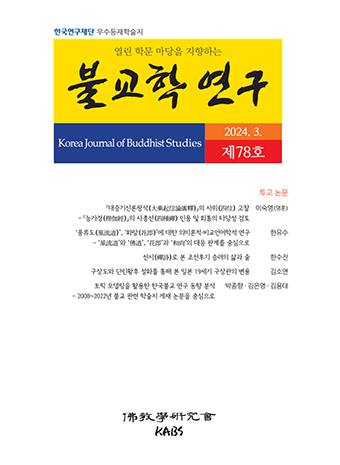Abstract
References
Sorry, not available.
Click the PDF button.
Information
We in these days know that concerns of 'peace' are universal, reflecting the situations in which many people have been serious to solve the problems of unpeaceful world as well as to create the culture of peace in global community. Nowadays, 'peace' denotes so much complex concept covering every fields of our lives, such as political, economic, social and cultural aspects. Generally nothing has not related with peace because everything could not be well without it. I will review and share some Buddhist ideas of peace in the traditional context, comparing it with URI (United Religions Initiative, a global religious organization matching to UN) movement for world peace. Regarding Buddhist peace in terms of harmonious coexistence in tranquility, we should pay attention to the state of one's mind and relation between and among existents, since Buddhism lead people to Nirvana that is the ultimate goal of Buddhist practice and refer peace in mind, life and the world.Regarding peace we can point out the basic Buddhist doctrinal sources as follow: Dependent Origination (pratītya-samutpāda)--to make peace is first to understand the condition of existence with taking responsibility of harmonious coexistence among personal, communal, social, national, global and environmental relations; The Three Clear Conceptions (Trividya)--if one could understand no self in reality and could overcome self-centered thinking and acting in the world, there would be peace; Four Novel Truths (chatur-ārya-satya)--discipline of the Eightfold Right Path (right views, thinking, speech, action, way of life, endeavor, mindfulness, and meditation) and Middle Path make peace of one's life and the world; Karma--a society and world have been depended upon our collective karma and people should keep in mind that their peaceful thoughts, words and deeds could make peaceful world; Precepts (Śīla)--basically respecting and protecting living beings, sound economic life, and faithful and truthful relations with the partners and others, make peace in a community and the world; Buddha Nature (Buddhadhātu, tathāgata-garbha)--we are supposed to respect and take care of all sentient beings as potential or future Buddha, and we should do our best to work as peace maker as the Buddha; Flower Ornament (Avatamsaka)--our minds should be opened and inclusive to make enlarge, enrich and more beautiful world with respecting differences of others to make harmonious and peaceful world; Wisdom (Prajňā) and Compassion (Karunā)--we should understand reality and use wisely and compassionately our resources for peace of all; Three Types of Learning (Precepts, Meditation and Wisdom)--managing one's life well in terms of morality, mentality and intelligence is good not only for oneself but also for the world peace; Two Ultimate Goals of Buddhists--attaining Buddhahood means attaining peace in one's life and achieving Pure Land means achieving peaceful world. As a Bodhisattva, an ideal personality of Buddhists who enlightens oneself and others as well as benefiting oneself and others, one should live in peace not only for oneself but also for others and the world.In the Charter of URI, Preamble (We, people of diverse religions, spiritual expressions and indigenous traditions throughout the world, hereby establish the United Religions Initiative......respect the uniqueness of each tradition, and differences of practice or belief...value voices that respect others, and believe that sharing our values and wisdom can lead us to act for the good of all... believe that our religious, spiritual lives, rather than dividing us, guide us to build community and respect for one another. Therefore, as interdependent people rooted in our traditions, we now unite for the benefit of our Earth community...), Purpose (to promote enduring, daily interfaith cooperation, to end religiously motivated violence and to create cultures of peace, justice and healing for the Earth and all living beings), Principles (We are a bridge-building organization, not a religion...respect the sacred wisdom of each religion, spiritual expression and indigenous tradition...respect the differences among religions, spiritual expressions and indigenous traditions...encourage our members to deepen their roots in their own tradition...listen and speak with respect to deepen mutual understanding and trust...give and receive hospitality...seek and welcome the gift of diversity and model practices that do not discriminate...practice equitable participation of women and men in all aspects of the URI...practice healing and reconciliation to resolve conflict without resorting to violence...act from sound ecological practices to protect and preserve the Earth for both present and future generations...) shows suitability to the Buddhist doctrine. In conclusion, it could be said in short that Buddhist thoughts and practices match the URI's ideas and movement in terms of peace making in the world. Proper Buddhist have been a kind of peace worker who practices nonviolence, tolerance and compassion, since they have not only sought Nirvana and taught interdependence of our existence but also tried to actualize it. It seems remarkable and hopeful that during the recent years Buddhists have been actively taking parts in the URI movement for the world peace.
Click the PDF button.
- Publisher :Korean Association of Buddhist Studies
- Publisher(Ko) :불교학연구회
- Journal Title :Korea Journal of Buddhist Studies
- Journal Title(Ko) :불교학연구
- Volume : 11
- No :0
- Pages :174~200


 Korea Journal of Buddhist Studies
Korea Journal of Buddhist Studies






